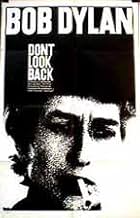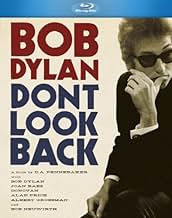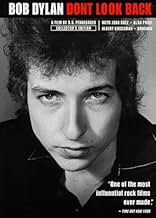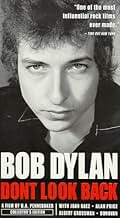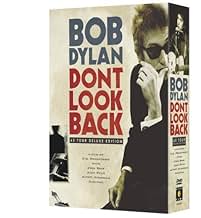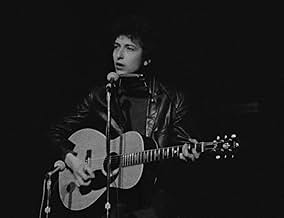Documentary covering Bob Dylan's 1965 tour of England, which includes appearances by Joan Baez and Donovan.Documentary covering Bob Dylan's 1965 tour of England, which includes appearances by Joan Baez and Donovan.Documentary covering Bob Dylan's 1965 tour of England, which includes appearances by Joan Baez and Donovan.
- Awards
- 4 wins total
- Self
- (uncredited)
- Self - science student
- (uncredited)
- Self
- (uncredited)
- Self
- (uncredited)
- Self
- (uncredited)
- Self
- (uncredited)
- Director
- Writer
- All cast & crew
- Production, box office & more at IMDbPro
Featured reviews
a term used to describe films that looked as if they were happening in real time. This is one of those films. It is a gritty black and white documentary that follows the legendary Bob Dylan during a tour in England. This is not a conventional rock documentary where we are shown endless concert footage and interviews with musicians talking about their philosophies and the meanings of their songs. Instead, the camera follows Dylan in a frenzy capturing every detail of social interaction with his fans, entourage, and the press. Dylan appears arrogant but it is no surprise when Pennebaker allows us to see the hypocrisy and greed of the outside world. A memorable moment in the film involves a fan whose invited himself backstage to meet Bob Dylan. He asks him absurd questions such as "what is your attitude on life?" Dylan decides to tease him and the conversation gets pretty ugly. Nevertheless, it is an important scene to the film because it shows us how difficult it is for a superstar such a Dylan to keep a smile and act nice to everyone. Do we gain sympathy for Dylan? We do because we see how alienated he feels among even his closest friends. We also feel a sense of envy for his ability to be so unapologetic and rebellious about his attitude. He is honest but he also has to protect himself from the public. After a Time magazine reporter asks him whether or not he cares what he's saying . Dylan attacks him and then tries to give him a straight answer . "Do you think anyone who comes to these concerts is looking for anything other then entertainment?" The next day, Dylan hears a quote from the papers that describes him as an anarchist. The sequence of these events show clearly how Dylan is at a loss with the public's perception of him. He can't just be himself. He wants to come across as a guy like anyone else but his sarcastic and meaningless interaction with the press only makes things worse. The film also includes appearances with Joan Baez, Donovan, Allen Ginsberg, and Dylan's sleazy manager Albert Grossman. I've seen this film dozens of times and I still see something new with every viewing. It is a true masterpiece.
In other words, this is not a portrait of the artist that I happen to like, but it is the truth (or at least it was at that time). In addition, Albert Grossman, Dylan's manager, is shown in possibly the least flattering light possible. A bonus is that the film begins with the brilliant 1965 promotional clip for "Subterranean Homesick Blues", and watch for the scene in a hotel room when Dylan and Bob Neuwirth sing "Lost Highway" - it's worth the price of admission.
Shot in black and white, the film shows Dylan to be very mercurial. He is at times charming, communicative and seemingly open about his feelings. Other times--in fact most of the time--he is confrontational, condescending and self-contradictory. He is about 24 years old and these scenes remind me of discussions I had when I was that age with other college students. His arguments are circular, as if he enjoys arguing more than he enjoys communicating.
He embraces the poet's privilege of not explaining the meaning of his lyrics (which is fine). One gets the feeling that he is tired of dealing with the media and others who want to pick his brain. Why did he give them audience, then? On the other hand, he is generous with fans who have no questions for him, merely seeking his presence or a glimpse of the man.
While some of his songs do seem somewhat shallow, others are undeniably deep with meaning about issues that are very timely. Regardless, his songs often have a hypnotic effect, with their sing-song cadences. This film might raise more questions than it answers, but it is fun to watch. The presence of Joan Baez is a plus. Her voice was always special. We don't see much of her, but enough to see her react to teasing and to make silly faces in return.
Dylan's songs feel mostly declarative. They are assertions and observations. They usually don't extract the emotional responses of, say, Joni Mitchell, who invites listeners to her inner world. Dylan asks his listeners to regard the outside world with him.
Did you know
- TriviaThe scene where Donovan visits Dylan in his hotel was generally viewed as Dylan putting the young singer-songwriter in his place when he grabs the guitar and performs "It's All Over Now, Baby Blue." But a 2015 Criterion Collection remaster, with improved sound, revealed that Donovan actually requested Dylan play that song for him. That gave the entire scene a new meaning and revealed Dylan and Donovan as more friends than rivals.
- Quotes
Albert Grossman: They've started calling you an anarchist.
Bob Dylan: Who?
Albert Grossman: The papers. That's the word now.
Bob Dylan: Anarchist?
Albert Grossman: Right. Yeah.
Bob Dylan: The newspaper's say I'm an anarchist?
Albert Grossman: Two or three. Just because you don't offer any solutions.
Bob Dylan: You're kidding!
Albert Grossman: Of course.
Bob Dylan: Anarchist? Huh? Give me a cigarette. Give the anarchist a cigarette. Anarchist? A singer such as I.
- ConnectionsFeatured in Precious Images (1986)
- How long is Bob Dylan: Dont Look Back?Powered by Alexa
Details
Box office
- Gross worldwide
- $934
- Runtime
- 1h 36m(96 min)
- Color
- Sound mix
- Aspect ratio
- 1.37 : 1


